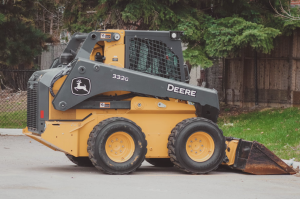Sustainable Solutions for Efficient Material Transportation

Sustainability has made its way over to the engineering and manufacturing industries with businesses looking to incorporate more eco-friendly solutions into their processes. Engineers and business owners can integrate sustainable technology and renewable energy sources into their day-to-day operations while still maintaining efficiency. This has made many aspects of such industries better for the environment.
Material transportation is a big part of many industries with them having to rely on the quick and efficient movement of materials by vehicles and machinery. Heavy duty vehicles and machinery that are capable of moving manufacturing and engineering materials are not often renowned for their eco-friendliness. However, there have been some advancements in this field with more vehicle manufacturers becoming more eco-conscious.
This guide will explore the best sustainable solutions for material transportation that are good for the environment while also remaining efficient.
Sustainable Material Transportation Solutions
Next-Generation Trucks
There was once a time when diesel trucks were the primary method of transporting materials for manufacturing and engineering jobs, as they were the most efficient. However, there have been sustainable advancements in transportation technology in recent years. Electric trucks have been one of the more popular technological advancements in this field and have had a big impact in many cities becoming carbon neutral by 2030.
These electric trucks are equipped with rechargeable batteries so that they can be recharged while on the road at any electric vehicle charging point. This type of transportation will be used to move materials around over a long distance as part of a delivery. In urban areas especially, these trucks will produce little to no pollution and are relatively silent.
Some other next-generation vehicles can also be used for transporting materials, such as:
- Compressed Natural Gas (CNG) Trucks: Reducing air pollution, CNG trucks produce fewer particles and nitrogen oxides compared to diesel trucks. These are also beneficial for operating costs as natural gas is often cheaper than fossil fuels.
- Biofuel Trucks: Using fuels made from renewable resources like plant crops, agricultural residue and organic waste, biofuel trucks significantly reduce the need to use fossil fuels when transporting materials.
- Bio-gas Trucks: Decaying organic matter, such as food waste, is used to keep these trucks running. They can help to reduce waste caused by transporting materials and promote a circular economy.
Electric Dumpers
Selecting the appropriate type of dumper for construction and material handling can have a big impact on cost, efficiency and the environment. The industry is moving towards more eco-friendly solutions, so the benefits of using electric dumpers for transporting materials have become even more relevant. These electric dumpers can often run a full day from one battery of charge and can then be charged overnight while not in use for maximum efficiency.
An electric dumper can carry heavy loads over challenging terrains with ease, including clay, sand, bricks and soil. The process can then be sped up, which will reduce the physical burden on employees. This enables more efficient and safer operations. For a more cost-effective solution, engineers and business owners can opt for dumper hire rather than purchasing a new dumper for a job. This is also a more sustainable practice than purchasing new dumper models.
Rail Transportation
Only 1.8% of total emissions stem from rail travel, which is incredible compared to the 71% of carbon emissions that come from road users. This means that using rail solutions might be the best form of material transportation in terms of sustainability. It’s also very efficient as railway transportation can be much quicker for transporting materials than on-road vehicles, especially over longer distances. There are also now electric locomotives that can be used to transport materials across the country.
The only downfall of rail transportation is that costs are high, especially for electric trains. In August 2023, rail freight operator DB Cargo UK announced the permanent retirement of its electric fleet and even Tim Shoveller, CEO of Freightliner UK, had to temporarily sideline electric trains earlier this year. However, electric trains are still set to be the future of UK material transportation with many businesses continuing to explore the possibilities.
Alternative Fuels
Using any other type of fuel than fossil fuels will have huge benefits for the environment. Hydrogen and biofuels can be used for several types of transportation options that can help with moving materials from one place to another. Fast refilling times and a long driving range make hydrogen fuel cells ideal for heavy-duty operations. In contrast, biofuels produced from renewable resources help to cut carbon emissions and the number of fossil fuels used up.
There have been large investments in research and infrastructure of alternative fuel technologies. This has created prerequisites for a more sustainable future. With this, it’ll lead to more innovations and progress within the material handling industry.
Fleet Planner Software
Optimising drivers’ routes can help with the efficiency of transporting materials and can provide a more eco-friendly solution. A fleet planner made especially for your materials can facilitate direct connection with drivers and optimise their return journeys using recycled materials if you utilise third-party material handlers.
Fleet planner software can lower expenses, boost capacity, and permit just-in-time deliveries. As a result, there are fewer trips required to deliver materials to the construction site, resulting in lower fuel use and carbon emissions. Furthermore, delivery schedules are designed to reduce idle time for trucks, which also lowers these factors for a much greener solution.
The planner’s algorithms scan the data and begin working immediately. It can then optimise the schedule in real time and cut down on empty kilometres when orders come in at the last minute or when other unforeseen occurrences occur.
Conclusion
The manufacturing and engineering industries strive for sustainability in material handling. New transportation technologies have emerged as a key area where these industries have attempted to improve and be greener. By embracing next-generation trucks, electric dumpers, rail transportation and alternative fuels, businesses that work in the relevant industries can significantly reduce their environmental impact while maintaining the efficiency of day-to-day operations.
These advancements not only contribute to a healthier and more eco-friendly planet but also offer economic benefits. By prioritising sustainable material transportation solutions, industries can pave the way for more sustainable practices in the future.






